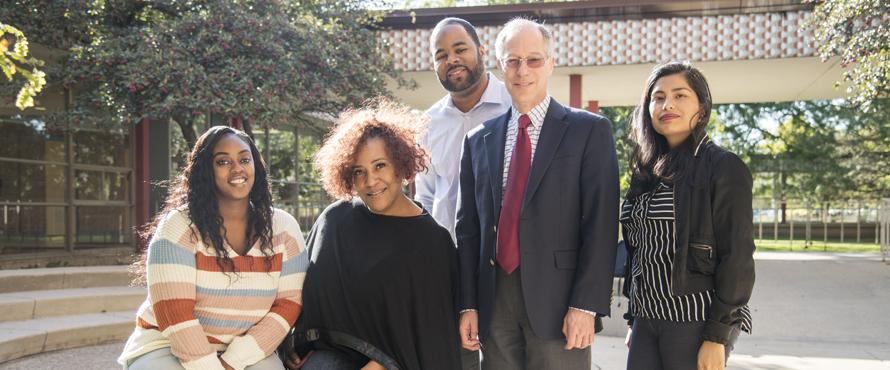Northeastern Illinois University is hosting four fellows during the 2019-20 academic year as part of a state program that is designed to increase the number of minority, full-time, tenure-track faculty and staff who work in the state’s public and private colleges and universities.
The Diversifying Higher Education Faculty in Illinois (DFI) program was launched in 2004 to address low rates of African American and Latinx faculty in the state’s two- and four- year institutions of higher learning. The program emerged out of two separate programs: the Illinois Consortium for Educational Opportunity Program (ICEOP) and the Illinois Minority Graduate Incentive Program (IMGIP). This year’s Northeastern fellows are Flor M. Reza, Candice Graddy, Phillip Lucas and Cherry Blakley.
All four hope to pursue doctoral degrees and one day teach.
“The program has funded my education thus far,” said Lucas, who expects to earn his master’s degree in Political Science next year. “With the funding came less worry and stress about having to work outside of school so I could concentrate on my studies. It’s also allowed me to be more active within the department and get more involved with conferences and professional activities related to my field of study.”
Lucas, a native Chicagoan, also earned his bachelor’s degree from Northeastern. He’s planning to apply for Ph.D. programs and is hopeful his DFI Fellowship will continue to assist him in earning a doctorate.
Reza earned her undergraduate degree in Human Development and Family Studies with a concentration in Child and Adolescent Development from the University of Illinois Urbana-Champaign. Reza then worked in the nonprofit sector for a couple of years. Desiring a career change, she decided to apply to Northeastern’s Engaging Latina/o Communities for Education (ENLACE) Higher Education Leadership program and was accepted. She’s now in her second year of the program, and first year of the fellowship.
“I’m very excited about the research projects we are encouraged to conduct as part of DFI,” Reza said. “I’m glad DFI gives us the opportunity and platform to be able to practice presenting our research projects because it can be a daunting experience – presenting your research, putting out there the stuff that interests you and having people see it.”
Reza is planning to start applying for Ph.D. opportunities as well as explore career options. She’s been thankful the program has been intentional this year with connecting fellows to the Career Development office.
Michael Stern, dean of Northeastern’s College of Graduate Studies and Research, believes the DFI Fellows program is important not just to Northeastern, but for the makeup of the nation’s professoriate.
“For the state it promotes a stronger pipeline to get a more diverse group of professors so students feel that they have role models in their classrooms,” Stern said. “It’s great that the state promotes this. There’s a national need for this, so it’s important to do.”
The State of Illinois provides DFI Fellows with a stipend. Northeastern takes that commitment one step further by also providing tuition and fee waivers for its fellows.
“A lot of our students need some financial help to successfully complete their programs,” Stern said. “This allows students to really focus on their programs without having to work an extra job, or not work at all, and helps them get started on the long journey to become professors.”
Vice President for Student Affairs Daniel López, Jr., was a DFI Fellow at Loyola University when he completed his master’s degree in education and now serves on the DFI Board of Directors.
“As a former DFI fellow, it is a privilege to represent NEIU and Illinois Latino Council on Higher Education on the DFI board,” López said. “The DFI program has been instrumental to my education and professional success. It allowed me to pay for my graduate degree and connected me with higher education professionals in the state of Illinois. The program also provided me with the opportunity to participate in the annual conference and learn from current fellows, former fellows, and African American and Latinx faculty and staff.”
López is proud to have DFI Fellows at Northeastern and sees the University’s commitment to these students as another way the school contributes to the broader community of scholars.
“I believe being a participating DFI university allows NEIU to live our mission of providing opportunities to our students,” López said. “Furthermore, it allows NEIU to recruit and prepare future higher education professionals so that they join the academy and continue to transform Illinois higher education in support of our community.”
Lucas and Reza echo those sentiments and are both grateful for the opportunities being a DFI Fellow is providing them with.
“Northeastern is such a great place,” Reza said. “I worked at the Pedroso Center last year and I’m currently working within the Division of Student Affairs. All of the opportunities at Northeastern have been a blessing. I genuinely love this institution and the many opportunities and mentors it has given me.”
Northeastern is seeking applicants for the 2020-2021 DFI Fellowship. Applications are due by Feb. 14, 2020.
Top photo: College of Graduate Studies and Research Dean Michael Stern (second from right) poses with DFI Fellows (from left) Candice Graddy, Cherry Blakley, Phillip Lucas and Flor M. Reza.








